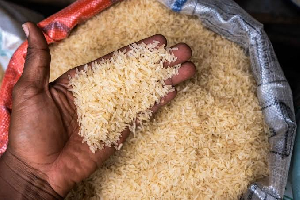The price of a 50kg bag of rice has surged across major Nigerian markets, with traders now quoting between N77,000 and N100,000.
The latest price is an increase from an average price of N65,000 quoted six months ago.
A market survey revealed that short-grain rice now sells for N77,000 to N85,000, while long-grain varieties are priced as high as N100,000 in markets such as Daleko and Mile 12 in Lagos.
Locally produced rice, previously sold for around N70,000 to N72,000, now goes for between N80,000 and N90,000.
Traders give reasons for new rice prices
Vanguard reports that traders have blamed the latest increase on the expiration of a 150-day duty-free import window under the Presidential Accelerated Stabilisation and Advancement Plan (PASAP), announced in July 2024.
The PASAP allowed select firms to import grains, including brown rice, without paying duties.
Bolatito Yunisa, a rice trader at Daleko Market, expressed frustration over the rising cost of rice and the state of the market:
“Honestly, I don’t understand the Nigerian system anymore. We’re frustrated. This isn’t business.
“Short grain rice that dropped to N65,000 is now selling for as high as N85,000. Long grain is going for between N90,000 and N100,000, and the price is still climbing.”
She linked the increase in the price of rice to the end of the temporary import relief.
She added: “Is this how we will keep living in this country? Where is the Nigerian rice? Millers say there’s not enough paddy, and many have stopped production due to forex issues. Do we just go hungry? Something isn’t right.”
At Mile 12 International Market, another trader, Mrs Bukola Osagie, also lamented.
“It’s not funny anymore. I don’t know how families are surviving. Prices just keep going up."
“Even as dealers, we now sell rice in Derica measures because most people can’t afford a full bag. It’s the only way we can keep making sales.”
Nigeria faces rice production shortfall
Nigeria is confronting a potential rice supply gap estimated at 2.18 million tonnes, translating to a value of about N1.43 trillion, driven by a decline in local production.
Forecasts for the 2024/2025 agricultural season suggest that milled rice output will fall from 5.60 million tonnes to approximately 5.22 million tonnes.
Similarly, paddy rice production is projected to reduce from 8.90 million tonnes to 8.30 million tonnes.
Meanwhile, rice consumption is on the rise, with the National Bureau of Statistics (NBS) projecting demand to reach 7.4 million metric tonnes by 2025.
This surge in consumption is largely due to rice’s growing popularity and its status as one of the more affordable staple foods available to Nigerian households.
The imbalance between rising demand and shrinking supply is expected to push rice prices upward.
Paddy rice prices are forecasted to increase from N1.10 million to N1.30 million per metric tonne by the third quarter of 2025, reflecting the production challenges facing the sector.
Food inflation drops
Earlier, Legit.ng reported that the National Bureau of Statistics has released its latest Consumer Price Index (CPI), which shows that the food inflation rate in June 2025.
According to NBS data, the food inflation rate stood at 21.97% on a year-on-year basis, which was 18.93 percentage points lower than the rate recorded in June 2024 (40.87%).
This significant decline is largely attributed to the change in the base year used for comparison.
Business News of Thursday, 31 July 2025
Source: www.legit.ng
Dealers increase prices for 50kg bag of rice across markets
Business












